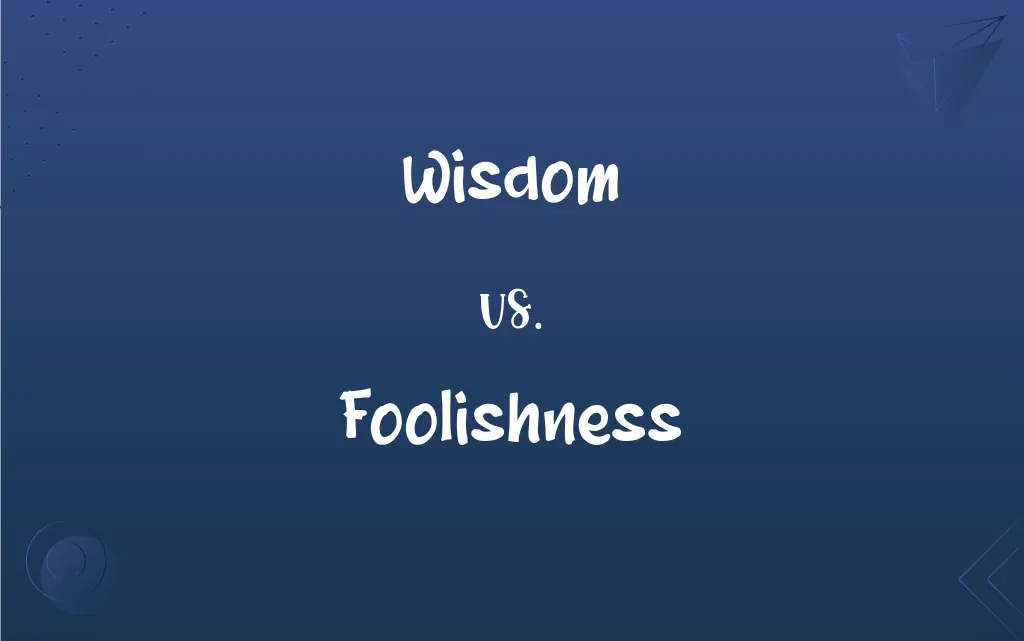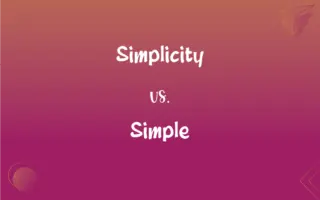Wisdom vs. Foolishness: What's the Difference?
Edited by Janet White || By Harlon Moss || Updated on November 7, 2023
Wisdom is the quality of having experience, knowledge, and good judgment; foolishness is lack of sense or judgment.

Key Differences
Wisdom is the accumulation of knowledge applied with good judgment and insight, often seen as a virtue that grows with experience and age. Foolishness is the lack of understanding or sense, often resulting in imprudent actions or decisions. Wisdom is proactive, foolishness is often reactive.
The wise person considers the long-term consequences and broader implications of their actions. In contrast, foolishness is characterized by shortsightedness and a focus on immediate gratification without regard for future outcomes. Wisdom is thoughtful; foolishness is often thoughtless.
Wisdom involves discernment, the ability to judge well, and to make decisions that are not only beneficial to oneself but also considerate of others. Foolishness, on the other hand, can involve reckless or irresponsible behavior that disregards the welfare of others. Wisdom is inclusive, foolishness can be selfish.
In literature and philosophy, wisdom is often associated with the sage who provides counsel and insight. Foolishness is frequently embodied by the fool, a character who is naive and lacking discretion. Wisdom is respected; foolishness is typically mocked or pitied.
Wisdom is an admired trait that people strive to cultivate through reflection and learning from experiences. Foolishness, meanwhile, is generally avoided and seen as something to overcome. Wisdom is a goal; foolishness is a pitfall.
ADVERTISEMENT
Comparison Chart
Definition
Quality of having insight and judgment
Lack of sense or judgment
Decision-making
Considered and prudent
Rash and imprudent
Learning
Gained through experience
Ignoring lessons of experience
Impact on Others
Often beneficial
Potentially harmful
Perception
Valued and respected
Disregarded and mocked
ADVERTISEMENT
Wisdom and Foolishness Definitions
Wisdom
Knowledge gained by a lifetime of experiences.
The elder's wisdom was sought by everyone in the village.
Foolishness
The quality of being unwise or imprudent.
She later regretted the foolishness of her impulsive words.
Wisdom
Insightful understanding of people and situations.
With wisdom, he navigated the complex negotiation successfully.
Foolishness
Acting in a way that is silly or not serious.
The students' foolishness was disruptive to the class.
Wisdom
The ability to make sound judgments.
Her wisdom was evident in her fair and effective leadership.
Foolishness
A silly act or idea.
Dressing like a superhero for the formal interview was pure foolishness.
Wisdom
Prudence in discerning the true nature of things.
She showed great wisdom in handling the delicate matter.
Foolishness
Lack of good sense or judgment.
His foolishness led him to invest in a dubious scheme.
Wisdom
Philosophical or spiritual insight.
The text offers wisdom on leading a meaningful life.
Foolishness
Behavior that shows a lack of understanding.
Ignoring the weather warning was the height of foolishness.
Wisdom
The ability to discern or judge what is true, right, or lasting; insight.
Foolishness
Lacking or exhibiting a lack of good sense or judgment; silly
A foolish boy.
A foolish purchase.
Wisdom
Common sense; good judgment
"It is a characteristic of wisdom not to do desperate things" (Henry David Thoreau).
Foolishness
Capable of arousing laughter; absurd or ridiculous
A foolish grin.
FAQs
What is an example of foolishness?
Ignoring advice and repeating mistakes.
Why is foolishness looked down upon?
Because it often leads to poor outcomes.
Can wisdom be taught?
It can be nurtured but often comes from personal growth.
Is wisdom the opposite of foolishness?
It is often considered the antithesis.
Is all risk-taking foolishness?
Not if the risks are calculated and considered.
What characterizes wisdom?
Insight, experience, and good judgment.
Is wisdom always beneficial?
Typically, yes, as it promotes well-being.
Is foolishness always intentional?
No, it can be the result of ignorance.
Can wisdom be flawed?
It can be, if based on incomplete information.
Can a young person be wise?
Yes, if they show exceptional insight and judgment.
How is wisdom gained?
Through diverse experiences and learning.
Why do people commit acts of foolishness?
Often due to inexperience or impulsive decisions.
Does foolishness always cause harm?
It can lead to harm, but not always.
How do we recognize wisdom in others?
Through their actions, advice, and outcomes.
Can wisdom and foolishness coexist?
A person may exhibit both in different aspects of life.
How can one avoid foolishness?
By learning from mistakes and thinking ahead.
Can foolishness be corrected?
Yes, with awareness and a desire to improve.
Do cultures value wisdom similarly?
Most cultures hold wisdom in high regard.
How does society benefit from wisdom?
Through better decision-making and guidance.
Is foolishness a sign of low intelligence?
Not necessarily, it may be a lapse in judgment.
About Author
Written by
Harlon MossHarlon is a seasoned quality moderator and accomplished content writer for Difference Wiki. An alumnus of the prestigious University of California, he earned his degree in Computer Science. Leveraging his academic background, Harlon brings a meticulous and informed perspective to his work, ensuring content accuracy and excellence.
Edited by
Janet WhiteJanet White has been an esteemed writer and blogger for Difference Wiki. Holding a Master's degree in Science and Medical Journalism from the prestigious Boston University, she has consistently demonstrated her expertise and passion for her field. When she's not immersed in her work, Janet relishes her time exercising, delving into a good book, and cherishing moments with friends and family.































































